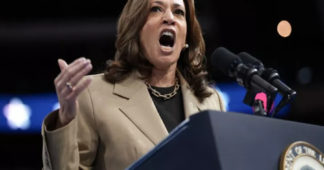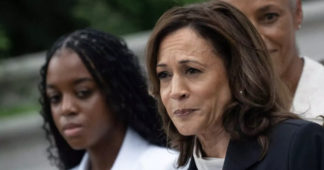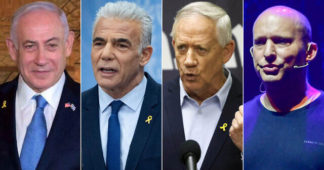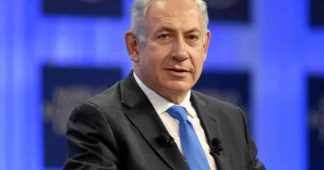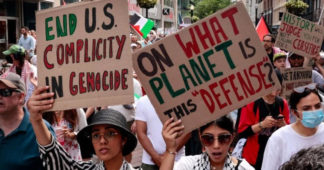US Vice President Kamala Harris has supported President Joe Biden, a seasoned politician with decades of foreign policy experience, on key international issues. With the former California attorney general and senator set to clinch the Democratic presidential nomination, it’s time for Harris to set her agenda on vital issues concerning the international community.
Leela JACINTO
Jul 23, 2024
When Prime Minister Binyamin Netanyahu addresses a joint session of Congress on Wednesday, the US vice president – who also serves as president of the Senate – will not be in her customary seat on the rostrum, behind the visiting Israeli leader.
Kamala Harris will instead be at another event in Indianapolis, addressing a national convention of the Zeta Phi Beta sorority, one of the nation’s oldest university organisations for African American female students.
Senator Benjamin Cardin, a staunchly pro-Israel senator from Maryland, will instead take the US vice president’s seat next to House Speaker Mike Johnson as Netanyahu becomes the first foreign leader to address a joint US Congressional session four times – pulling ahead of Britain’s Winston Churchill, at three.
Harris’s team informed the US Senate she would not preside over Netanyahu’s speech before the dramatic developments of the weekend, when President Joe Biden bowed out of the 2024 White House race, endorsing his 59 year-old vice president as Democratic nominee.
Briefing reporters on Monday about the scheduling clash, Harris’s aides played down the import of her absence, noting that the vice president will meet Netanyahu separately during his first foreign visit since the October 7 Hamas attack.
But with Harris set to clinch the Democratic nomination, her decision to skip Netanyahu’s address has come under intense scrutiny, highlighting the divisions among US voters on the Gaza war in the lead-up to the November presidential election.
Foreign policy is not the strong suit of the woman aiming to be the 47th president of the USA. It’s also a particularly fraught issue for Washington’s allies as they warily eye US security commitments after Trump picked Senator JD Vance – who has openly touted isolationist foreign policies – as his running mate.
On ‘terra incognita’
A law school graduate and former California attorney general, Harris has spent much of her political career focused on domestic issues.
As vice president, she bucked a longstanding trend in US politics, which has seen the country’s second-most powerful official provide foreign policy expertise to newly elected presidents.
In the 2000 race for instance, when George W. Bush picked Dick Cheney – who had served as his father’s defence secretary during the Gulf War – as a running mate, it was viewed as a counterweight to the younger Bush’s lack of foreign policy experience.
Biden’s appointment as Barack Obama’s running mate was perhaps the best example of a newcomer president seeking a counsel-in-chief on international issues.
Vice President Harris, in contrast, had little foreign policy advice to offer a president who spent 36 years in the US Senate and eight in the White House.
“We’re in terra incognita here, since we don’t know very much about her foreign policy orientation,” said Steven Ekovich, a US politics and foreign policy expert and professor emeritus at the American University of Paris.
After nearly four years in the White House, Harris should be “up to date” on foreign policy issues, Ekovich noted, since vice presidents attend US National Security Council meetings and briefings. “I would assume that at least for the immediate future, she would keep the same direction and the same team. I can’t imagine her changing things right away. I think she’ll probably be running on a campaign of continuity.”
‘Far greater empathy’ for Palestinians
On the Israeli-Palestinian issue, support for a two-state solution and Israel’s right to self-defence are continuity positions Harris has held since she was elected to the US Senate from California in 2017.
As vice president, Harris has been careful not to contradict Biden’s positions on the Israeli assault on Gaza following the October 7 Hamas attacks. But she has pushed the envelope with her starkly forthright condemnations of Palestinian casualties and the “humanitarian catastrophe” in Gaza.
At a March 5 event commemorating the 1965 crackdown on civil rights marchers in Selma, Alabama, Harris blasted the inhumane conditions in Gaza, directing the bulk of her comments at the Israeli government.
“People in Gaza are starving. The conditions are inhumane and our common humanity compels us to act,” said Harris. “The Israeli government must do more to significantly increase the flow of aid. No excuses,” she added.
A month later, the US vice president once again called on Israel to “do more to protect aid workers” after an Israeli strike on a humanitarian convoy killed seven World Central Kitchen staffers, including a US national
The death of seven humanitarian workers from World Central Kitchen in Gaza, including one American, is a devastating tragedy. The investigation must be swift, and steps must be taken to ensure this does not happen again.
Israel must do more to protect aid workers who are…
— Vice President Kamala Harris (@VP) April 3, 2024
In an interview with the Wall Street Journal, Jim Zogby, founder of the Arab American Institute, said he had a phone conversation with Harris in October and that she had demonstrated “far greater empathy” for Palestinians than Biden and other White House aides.
An eye on young voters in swing states
Democrats are deeply divided over the Gaza war and dozens of left-wing lawmakers within the party are expected to boycott Netanyahu’s speech on Wednesday.
These include members of “the squad”, the informal group of young, progressive lawmakers, many of whom – such as New York Representative Alexandria Ocasio-Cortez – have endorsed Harris’s White House bid.
Kamala Harris will be the next President of the United States. I pledge my full support to ensure her victory in November.
Now more than ever, it is crucial that our party and country swiftly unite to defeat Donald Trump and the threat to American democracy.
Let’s get to work.
— Alexandria Ocasio-Cortez (@AOC) July 22, 2024
With opinion polls over the past few months consistently showing younger Americans to be more pro-Palestinian than their elders, Harris’s absence at Netanyahu’s address is for “electoral purposes”, according to Ekovich.
“This is particularly true for a couple of swing states like Michigan, where there’s Detroit,” he said, referring to the city’s large Arab and African American communities. “In Pennsylvania, we have Philadelphia, which has a large Black population. There is a kind of allergy to Biden’s very strong pro-Israeli position in these places.”
But while the presumptive Democratic presidential candidate has chosen to skip Netanyahu’s address, Ekovich says Harris is unlikely to radically change US policy on the Israeli-Palestinian issue.
Attending summits Biden skipped
Continuity is also likely to mark Harris’s positions on the Ukraine war and US commitments to NATO, says Ekovich.
The US vice president has met Ukrainian President Volodymyr Zelensky at several international summits, including this year’s Munich Security Conference, where she has stood in for Biden for three consecutive years.
At her last meeting with Zelensky at the Ukraine Peace Summit in Switzerland in June, Harris pledged $1.5 billion in aid for Ukraine’s energy sector as well as $379 million in humanitarian assistance.
On China, experts say Harris shares Biden’s positions on security in the Asia-Pacific region and Taiwan. She has also vociferously denounced Beijing’s human rights record in Hong Kong as well as the Uighur-dominated Xinjiang province.
Senior Democrats note that Harris has stepped in as a surrogate for Biden at several international gatherings, including ASEAN and Asia Pacific Economic Cooperation (APEC) meetings, giving her valuable foreign policy experience.
“Frankly, she has been stress-tested,” said Representative Adam Smith in an interview with the Politico news site. “She has been the lead spokesperson for the administration at the Munich Security Conference making the case for our role in Ukraine and NATO and in the world, and she’s been really strong.”
Mixed record on Latin America
On Latin America though, her record has been mixed.
Early in his presidency, Biden asked Harris to try to address the root problems of migration at the southern border by focusing on countries in Central and South America.
Sticking to the White House brief, Harris repeated the “don’t come” message to migrants illegally trying to cross the southern border with Mexico, much to the chagrin of left-leaning Democrats.
But most experts concede it was an impossible mission and not just for the new vice president. “She was given the immigration file and of course, she didn’t solve it because nobody has. Nobody can,” said Ekovich.
But Harris managed to weather the migrant storm by backing a bill providing more funding for US border guards and agencies. The bill was however blocked by the Republicans earlier this year.
Trump has made “illegal immigrants” a central plank of his campaign and is likely to try to corner Harris on the issue. But Ekovich says Trump’s tactics could backfire. “If the Republicans, if Trump and Vance, go after her on this, she can just respond that there was a bill on it and the Republicans blocked it,” he explained.
We remind our readers that publication of articles on our site does not mean that we agree with what is written. Our policy is to publish anything which we consider of interest, so as to assist our readers in forming their opinions. Sometimes we even publish articles with which we totally disagree, since we believe it is important for our readers to be informed on as wide a spectrum of views as possible.

